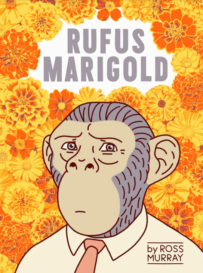Anti-interview with David Rose
This is not an interview. I do not want to probe, or enter, to delve, to fathom; I do not want to see, or examine, I am not a surveyor. This is not an interview. Most interviews are boring, trite, an exercise in the ostentatious, the pavonine, an anthology of name dropping, sesquipedalianism, back-slapping, sycophantic saliva swapping. I have a few things that I want to share, this tête-à-tête is basically all about me, and to show me off in a wonderful, iridescent light I am going to employ not a light bulb but a great writer, and I mean a great writer, and hopefully some of the greatness will rub off on me.
Not the first question. These are not questions. You may jump around with the wild abandonment of a flea if you so wish. What you are about to read are a few rhetorical deadends. All writing inevitably ends at a cul-de-sac. It is only here that writing and life mirror one another. Life is real, unfortunately, writing can never be real, no matter how much the writer tries to explain the flow of the protagonist’s shaggy eyebrows they will at the closing of the book always be ink smudges on a page.
I wrote a flawed book about a flawed hero committing a flawed crime in a flawed style with flawed words you wrote an anti-book.
I too wrote a flawed book, but in my case it wasn’t intentional, it just came out that way. The “anti-novel” tag was stuck on later, but the idea was for the two strands to cancel each other out, leaving a novel-shaped hole.
I find the writer can never escape the book he is writing, he will be there like an unwanted Siamese twin, the unwanted appendage might not have a mouth to speak with, but the unwanted appendage will try to communicate. Some writers fight hard to silence the unwanted appendage, while others allow the unwanted appendage to communicate freely.
I like the Siamese twin idea; it’s true, we remain conjoined to our books however hard we try to distance ourselves. But in the end, that’s what gives life to the smudges on paper – and some smudges have more life than others. Then, with the author’s death, some books live on, dragging the demented ghosts of the writer with them but with the roles reversed. Now the ghosts (of Flaubert, Cervantes…) draw their life from the books, which become real while the writer is now fiction.
I read certain books by contemporary writers, such as yourself, that have zoomed off into the ether and there they wait for an audience to catch up to them.
Vault was an exploratory rocket fired into space; it may now have escaped literary gravity and be floating unreachable in the ether. Maybe readers will never catch up. Mahler said “My time will come” but it took fifty years. The story collection, the satellite to follow the rocket, may follow in a couple of years, but depends on the success of Vault. The title “Posthumous Stories” may end up being literal.
I am drawn to Ballard’s mundane house and de Sade’s Prison Cell. I feel there is an analogy there that should be explored.
I must confess that the analogy between Ballard’s house and de Sade’s prison cell had escaped me. As it happens, I live near Shepperton, ten minutes by bike. I never met him.
Maybe that mundanity was necessary to him, as soothing as a prison cell. I saw a photo of his study once, in a series of writers’ studies, most of them spacious, middle class, book-lined. His was a small table, an upright chair and a portable typewriter. The only distinction was the huge and dominating hand-painted replica of a surrealist painting, by Delvaux, I believe. One possible pointer: estate agents’ descriptions of the house, now on the market, refer to the electrical wiring, it being the original wiring, complete with original, Bakelite fittings. Maybe it was that element of danger – Russian roulette in switching on the light – that Ballard needed to spring himself from the prison-house of the self. Along with the Siamese twin.
I spent many years on a bicycle when I worked for the Royal Mail. I hated the bicycle. The seat was hard and when I defecated my arse bled. I was very embarrassed. The bicycle for Beckett and O’Brien was very important. Let’s finish on a mundane note. Let’s show the reader that we can if we so choose partake in the rather ubiquitous question and answer stuff. Let us be flamboyant. Tell me why you picked the bicycle?
Back to the bike. The original idea for Vault – a man wresting back his life and death from the hands of a novelist – contained no further clue as to the nature of the life.
So, “write what you know”. I don’t know much. A life in the post office? Stefan Zweig beat me to it. Cycling I know a little about; I’ve done some, spent years on a bike. Yes, I’ve been saddle-sore. Not to your sanguinary extent, though: I sympathize. You sound like a refugee from Molloy or Malone Dies! Beckett is implicated here too. The opening image of the cyclist as centaur, a conceit developed in the book, I later realized stemmed from a brilliant essay by Hugh Kenner – The Cartesian Centaur – about the predominance of bicycles in Beckett. I had forgotten all memory of reading it.
It all panned out.
—————————
Paul Kavanagh’s ‘The Killing of a Bank Manager‘ is out now, priced £7.99/$12.99.
Tags: anti-interview, anti-novel, ballard, beckett, david rose, de sade, delvaux, interviews, o'brien, paul kavanagh, pk, stefan zweig, the killing of a bank manager, vault














